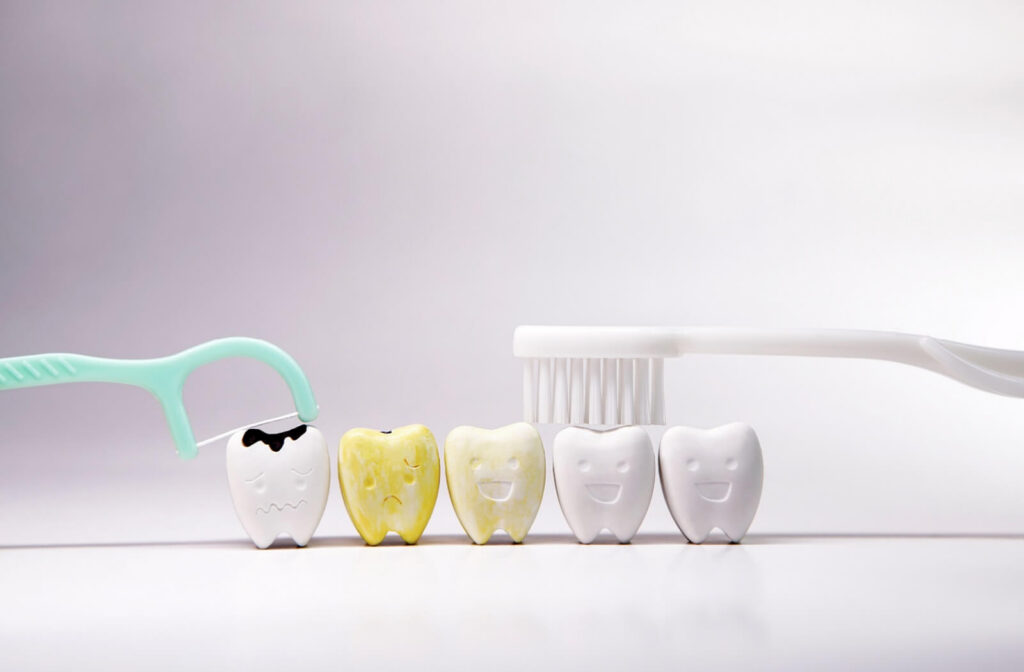
Nobody wants to deal with cavities. Left unchecked, they can cause significant issues for your teeth and gums. Sure, a dentist can step in and treat a cavity, but wouldn’t it be better to avoid them from the start? If you’ve ever experienced a toothache or spotted a discolouration on your teeth, it’s possible you’ve pondered: is this a cavity? Or could it be merely a tooth stain? How do you discern between the two?
Tooth stains and cavities may both lead to discolouration, but they are not identical issues. Should you feel any discomfort or sensitivity in your tooth or surrounding region, you are probably dealing with a cavity.
What Is a Cavity?
The structure of your teeth is built on three crucial layers: the enamel, dentin, and pulp. Visible to the naked eye, the enamel forms the robust outer shield of your tooth. Like a knight’s armor, it serves as a protective barrier for the tooth’s core structure, safeguarding delicate areas during actions like chewing, eating, and grinding.
However, this armor isn’t entirely unassailable and may suffer wear and tear or excessive bacterial exposure on occasion. When this does occur, it may result in a minor breach in the enamel, allowing bacteria to penetrate the shield. This is known as a cavity, but is frequently labeled as tooth decay or dental caries.
Consequently, it can spread and multiply. Imagine it as an ideal nesting spot for bacteria and potential pollutants. Food particles, spit, and fluids find their way into this tiny crevice, exacerbating the issue. Ignoring this can eventually lead to it infiltrating the dentin layer, a softer and more vulnerable region. And if neglected for an extended duration, it can penetrate the pulp, the most delicate section.
Should bacteria invade this zone, they may trigger conditions like abscesses, infections, and a host of serious dental issues with enduring implications.
What Causes a Cavity?
Cavities are the unpleasant result of the buildup of plaque, a bacteria-laden sticky film, on your teeth. It’s this plaque that releases acids, gradually wearing away your tooth enamel. Plaque buildup can stem from a variety of sources such as:
- Substandard oral cleanliness. Consistently brushing your teeth is essential for eliminating plaque and bacteria, and if you’re not maintaining good oral hygiene, your teeth become vulnerable.
- Overindulgence in sugary treats. Sweet foods and beverages serve as a banquet for damaging bacteria, leading to an increase in acid production within your mouth.
- Consumption of highly acidic foods and beverages. These can compromise your tooth enamel, leaving your teeth more prone to decay.
- Chronic dry mouth. Saliva is a vital player in neutralizing harmful acids and warding off cavities. A deficiency in saliva means a higher likelihood of tooth decay.
When you expose yourself to these factors, your chances of getting a cavity escalate.
Are Cavities & Tooth Stains the Same Thing?
How can you differentiate a mere tooth stain from an emerging cavity? Cavities frequently start as an obvious spot of discoloration on your teeth. The essential distinction is established by its sensation.
There are no physical feelings associated with a tooth stain, it doesn’t bring any kind of pain or discomfort. Touch it or tap the area around it and you won’t feel a thing. It’s nothing more than a visual blemish.
Alternatively, experiencing a cavity can bring intense sensitivity and discomfort. Prodding it or putting pressure could lead to an unpleasant feeling due to the nerve in your tooth getting agitated by damaging bacteria. This sensitivity intensifies remarkably if the bacteria penetrate the dentin or pulp layers, which are significantly more delicate than the enamel.
How to Prevent Cavities?
Great news! With a proactive stance, you can often prevent tooth decay. A strict regimen of oral care plays a crucial part in this. Make sure you’re brushing your teeth a minimum of twice daily for at least two minutes each time. Follow this with a good floss and a quick swish of mouthwash to finish it all off. Here are some more helpful tips to bear in mind:
- Restrict your consumption of foods and drinks high in sugar and acidity
- Keep yourself hydrated. Water helps to wash away food residue and harmful bacteria.
- Opt for dental products that are rich in fluoride—it does wonders for strengthening your tooth enamel!
- Steer clear of tobacco
- Maintain a well-balanced diet, high in calcium.
And remember, regular dental checkups are essential! They allow a trained professional to spot any potential issues early, before they escalate into more serious problems.

What if You Have a Cavity?
Feel the pinch of a possible cavity or suspect signs of tooth decay sneaking up on you? Say no more. Rush in to Generations Dental. Our squad of dental superstars is geared up to protect your pearly whites, keeping them robust and radiant. Don’t let that cavity lurk unnoticed or untreated, book an appointment today!


